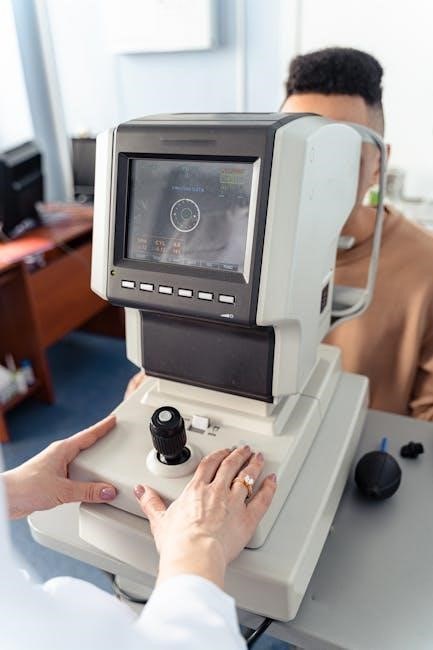brief cognitive assessment tool pdf

Brief cognitive assessment tools are essential for quickly evaluating cognitive function in clinical settings․ They enable early detection of impairments and monitoring of progression, supporting timely diagnosis and interventions․
1․1 Overview of Cognitive Assessment Tools
Cognitive assessment tools are designed to evaluate various aspects of cognitive function, such as memory, executive function, and attention․ These tools are essential in clinical settings for early detection of impairments and monitoring progression․ The Brief Cognitive Assessment Tool (BCAT) and Montreal Cognitive Assessment (MoCA) are widely used examples, offering structured frameworks to assess cognitive domains․ They are administered in short durations, typically 10-15 minutes, and include standardized questions with clear scoring guidelines․ These tools help identify cognitive changes and guide further diagnostic steps, making them invaluable in clinical practice․
1․2 Importance of Brief Cognitive Assessments in Clinical Settings
Brief cognitive assessments are crucial in clinical settings for early detection of cognitive impairments, enabling timely interventions․ Tools like the BCAT and MoCA provide quick evaluations of memory, executive function, and attention, aiding in diagnosing conditions such as mild cognitive impairment or dementia․ These assessments are efficient, requiring only 10-15 minutes, and are reliable for monitoring progression and guiding personalized care plans․ They are indispensable for clinicians to make informed decisions and improve patient outcomes in diverse clinical environments․
The Brief Cognitive Assessment Tool (BCAT)
The BCAT is a multi-domain assessment tool evaluating memory, executive functions, and attention․ It is administered in 10-15 minutes, making it efficient for clinical and research settings․
2․1 Key Features of the BCAT
The BCAT is a multi-domain tool assessing memory, executive functions, attention, and contextual memory․ It evaluates cognitive domains in 10-15 minutes, making it ideal for quick assessments․ The tool is sensitive to various cognitive levels, from normal function to dementia․ It provides separate Memory and Executive Functions Factor scores, enhancing diagnostic precision․ The BCAT also includes standardized administration and scoring guidelines, ensuring reliability and consistency across assessments․ Its design supports early detection and monitoring of cognitive changes in diverse clinical and research settings․
2․2 Administration and Scoring Guidelines
The BCAT is administered by professionals or trained technicians in 10-15 minutes․ It involves standardized questions assessing various cognitive domains․ Scoring guidelines are clear, with a maximum score of 20․ Results categorize cognitive function, guiding clinical decisions․ The tool includes detailed instructions for recording responses accurately, ensuring consistency․ Its structured format minimizes variability, enhancing reliability and validity; Proper training is recommended for administrators to ensure accurate and effective use of the BCAT in clinical and research settings․

Other Widely Used Brief Cognitive Assessment Tools
Beyond the BCAT, tools like the Montreal Cognitive Assessment (MoCA) and Mini-Cog are widely used․ The MoCA is a 10-minute test for mild cognitive impairment, while the Mini-Cog screens for dementia, combining a clock-drawing task with memory recall, offering quick insights into cognitive status․
3․1 Montreal Cognitive Assessment (MoCA)
The Montreal Cognitive Assessment (MoCA) is a widely used, 10-minute screening tool for mild cognitive impairment․ It assesses multiple cognitive domains, including memory, language, and executive functions․ The MoCA is known for its higher sensitivity compared to other tools like the MMSE, making it effective in detecting early cognitive changes․ It is available in multiple languages and is commonly used in clinical and research settings worldwide, providing a reliable measure of cognitive function․
3․2 Mini-Cog and Other Screening Tools
The Mini-Cog is a brief cognitive screening tool combining a 3-item recall and clock-drawing test, effective in primary care for detecting dementia․ Other tools, like the GPCOG and Short IQCODE, also provide quick assessments․ While these tools are useful, no single one is considered the best, and their selection depends on clinical context․ They are not diagnostic but help identify individuals needing further evaluation, with specific cut-off scores indicating potential cognitive concerns․
Components of a Comprehensive Brief Cognitive Assessment
A comprehensive brief cognitive assessment evaluates key domains like orientation, memory, executive functions, and attention․ Tools like the BCAT include structured tasks to measure these abilities effectively․
4․1 Cognitive Domains Assessed
Cognitive assessments evaluate key domains such as orientation, memory, executive functions, and attention․ Tools like the BCAT include structured tasks to measure these abilities․ Orientation involves time, place, and person awareness․ Memory assessments test recall of information, while executive functions focus on problem-solving and decision-making․ Attention tasks evaluate focus and ability to shift between stimuli․ These domains provide a comprehensive overview of cognitive function, aiding in early detection of impairments and monitoring progression․ This structured approach ensures accurate and reliable results․
4․2 Interpretation of Results and Cut-Off Scores
Brief cognitive assessment tools provide clear scoring guidelines to interpret results․ For example, the BCAT has a total score of 20, with higher scores indicating better cognitive function․ Cut-off scores help identify impairments, such as <10 for dementia and 10-15 for mild cognitive impairment (MCI)․ Tools like MoCA also use specific thresholds to detect cognitive deficits․ These standardized scores aid clinicians in making informed decisions, ensuring consistent and reliable interpretations across assessments․ Accurate scoring is critical for diagnosis and monitoring․

Reliability and Validity of Brief Cognitive Assessment Tools
Brief cognitive tools demonstrate strong reliability and validity, with high test-retest consistency and inter-rater agreement․ They effectively measure cognitive domains, ensuring accurate and consistent assessments across diverse populations․
5․1 Test-Retest Reliability and Inter-Rater Agreement
Brief cognitive tools like the BCAT exhibit strong test-retest reliability, ensuring consistent results across repeated administrations․ Inter-rater agreement is also high, with standardized scoring minimizing variability․ These metrics highlight the tools’ dependability in assessing cognitive function accurately and consistently across diverse populations and clinical settings․
5․2 Validity in Diverse Populations and Settings
Brief cognitive tools demonstrate strong validity across diverse populations, including cultural and linguistic variations․ The BCAT has shown effectiveness in assessing cognitive function in Anishinaabe populations, while MoCA is widely validated in global settings․ These tools adapt well to different clinical environments, ensuring accurate and meaningful results․ However, cultural biases remain a consideration, necessitating careful tool selection and adaptation to ensure fairness and accuracy in diverse contexts․

Clinical Applications of Brief Cognitive Assessments
Brief cognitive assessments are vital in early detection of impairments, monitoring rehabilitation progress, and guiding clinical decision-making․ They aid in identifying cognitive changes and informing treatment plans effectively․
6․1 Early Detection of Cognitive Impairment
Brief cognitive assessments play a crucial role in identifying early signs of cognitive decline, such as memory loss or executive dysfunction․ Tools like the BCAT and MoCA are designed to detect mild impairments, enabling timely interventions․ Early detection allows for prompt referrals, personalized care plans, and better patient outcomes․ These tools are particularly valuable in primary care settings, where quick, accurate screening is essential for managing conditions like dementia or mild cognitive impairment (MCI)․
6․2 Monitoring Progress in Cognitive Rehabilitation
Brief cognitive assessments are invaluable for tracking progress in cognitive rehabilitation․ Tools like the BCAT and MoCA provide consistent measures to evaluate changes in cognitive function over time․ Regular administration allows clinicians to assess improvements in memory, executive functions, and attention․ This data informs treatment adjustments, ensuring personalized and effective rehabilitation plans․ Such tools are particularly useful in clinical settings, offering insights into patient progress and the efficacy of interventions․
Limitations and Challenges of Brief Cognitive Assessments
Brief cognitive assessments may have cultural biases and lack standardization, potentially missing subtle impairments․ They require skilled administration and interpretation to ensure accurate results․
7․1 Potential Biases and Cultural Considerations
Brief cognitive assessments may exhibit cultural biases, affecting accuracy across diverse populations․ Tools like the BCAT require cultural adaptation to ensure fairness․ Education and language differences can influence results, necessitating careful validation․ Additionally, reliance on Western norms may limit their effectiveness in non-Western settings, highlighting the need for culturally sensitive assessments to avoid misdiagnosis and ensure equitable care for all individuals․
7․2 Lack of a Gold Standard in Cognitive Screening
The absence of a universally accepted gold standard for cognitive screening complicates tool selection and validation․ While tools like the BCAT and MoCA are widely used, their variability in design and focus means no single tool is universally reliable․ This lack of consensus challenge’s clinicians’ ability to consistently detect and monitor cognitive impairments, emphasizing the need for careful tool selection based on specific clinical and cultural contexts․

Future Directions in Brief Cognitive Assessment
Future advancements focus on integrating technology for enhanced accuracy, cultural adaptability, and accessibility․ Developing tools with higher sensitivity and specificity remains a priority for improved cognitive screening outcomes․
8․1 Integration of Technology for Enhanced Assessments
Technology is revolutionizing brief cognitive assessments by enabling digital platforms, AI-driven scoring, and remote administration․ These advancements improve accessibility, reduce biases, and allow for real-time data analysis․ Digital tools like the BCAT can now incorporate multimedia elements, enhancing engagement and accuracy․ Additionally, technology facilitates the integration of cultural adaptations, making assessments more inclusive․ This integration also supports longitudinal tracking of cognitive changes, aiding in early detection and personalized interventions for diverse populations․ Enhanced technology ensures more efficient, reliable, and patient-centric cognitive evaluations․
8․2 Development of More Sensitive and Specific Tools
Future advancements aim to create cognitive assessment tools with heightened sensitivity and specificity․ These tools will better detect subtle cognitive changes, improving early diagnosis and monitoring․ Enhanced specificity ensures accurate identification of impairments, reducing false positives․ Researchers are exploring multidomain assessments and culturally adapted versions to address diverse populations․ By refining test items and incorporating feedback from clinicians, next-generation tools will provide more precise evaluations, enabling tailored interventions and improving patient outcomes across various clinical and cultural contexts․